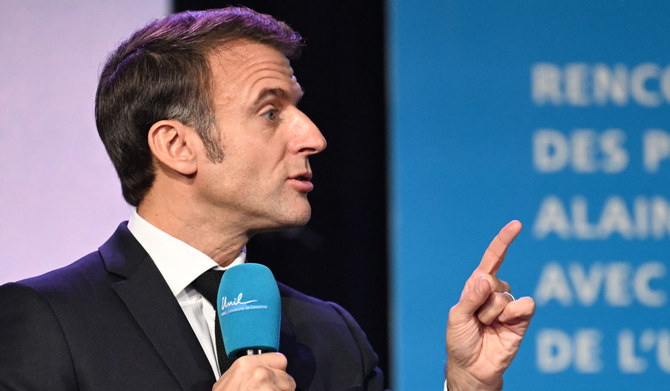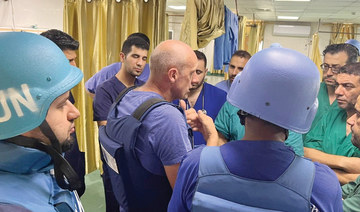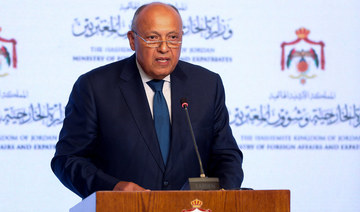PARIS: French President Emmanuel Macron told Israeli Prime Minister Benjamin Netanyahu there were “too many civilian losses” in Israel’s war against Hamas in Gaza, his office said Sunday.
Israel has vowed to destroy the Palestinian militant group after it carried out the deadliest attack in the country’s history on Oct. 7.
About 1,200 people, mostly civilians, were killed in Israel during the attack and around 240 taken hostage, according to Israeli officials.
The retaliatory Israeli air and ground campaign has killed 13,000 people in Gaza, mainly civilians and including thousands of children, according to the territory’s Hamas-run health ministry.
Macron, whose country is a firm ally of Israel, reminded Netanyahu of the “absolute necessity to distinguish terrorists from the population” and “the importance of achieving an immediate humanitarian truce leading to a ceasefire.”
Macron also condemned violence against Palestinian civilians in the West Bank in a conversation with Palestinian president Mahmud Abbas, the French presidency said.
The French leader told Netanyahu about his “great concern over the escalation in violence against Palestinian civilians” in the West Bank and called for calm.
Macron also told Abbas of “the need for the Palestinian Authority and all countries in the region to unequivocally and with the greatest firmness condemn the terrorist attack carried out by Hamas in Israel on October 7.”
Israeli troops and settlers have killed more than 200 Palestinians in the West Bank since the war began, according to the health ministry in Ramallah.
Earlier on Sunday, Macron’s office announced that France was preparing to send a helicopter carrier to the eastern Mediterranean to offer medical assistance in Gaza.
Macron tells Netanyahu ‘too many civilian losses’ in Gaza
https://arab.news/zq287
Macron tells Netanyahu ‘too many civilian losses’ in Gaza

- French leader reminds Israeli counterpart ‘absolute necessity to distinguish terrorists from the population’
Iran rebukes G7 statement over its nuclear program escalation

- Tehran’s foreign ministry calls on G7 to distance itself from ‘destructive policies of the past’
- Iran is now enriching uranium to up to 60 percent purity close to the 90 percent weapons grade
On Friday, the G7 warned Iran against advancing its nuclear enrichment program and said they would be ready to enforce new measures if Tehran were to transfer ballistic missiles to Russia.
“Any attempt to link the war in Ukraine to the bilateral cooperation between Iran and Russia is an act with only biased political goals,” Kanaani said, adding that some countries are “resorting to false claims to continue sanctions” against Iran.
Last week, the UN nuclear watchdog’s 35-nation Board of Governors passed a resolution calling on Iran to step up cooperation with the watchdog and reverse its recent barring of inspectors.
Iran responded by rapidly installing extra uranium-enriching centrifuges at its Fordow site and begun setting up others, according to a International Atomic Energy Agency (IAEA) report.
Kanaani added Tehran would continue its “constructive interaction and technical cooperation” with the IAEA, but called its resolution “politically biased.”
Iran is now enriching uranium to up to 60 percent purity, close to the 90 percent of weapons grade, and has enough material enriched to that level, if enriched further, for three nuclear weapons, according to an IAEA yardstick.
Israeli military announces ‘tactical pause’ in attempt to increase flow of aid into hard-hit Gaza

- The pause is aimed at allowing aid trucks to reach the Israel-controlled Kerem Shalom crossing
JERUSALEM: The Israeli military on Sunday announced a “tactical pause” in its offensive in the southern Gaza Strip to allow the deliveries of increased quantities of humanitarian aid.
The army said the pause would begin in the Rafah area at 8 a.m. (0500 GMT, 1 a.m. eastern) and remain in effect until 7 p.m. (1600 GMT, noon eastern). It said the pauses would take place every day until further notice.
The pause is aimed at allowing aid trucks to reach the nearby Israel-controlled Kerem Shalom crossing, the main entry point for incoming aid, and travel safely to the Salah a-Din highway, a main north-south road, to deliver supplies to other parts of Gaza, the military said. It said the pause was being coordinated with the UN and international aid agencies.
The crossing has suffered from a bottleneck since Israeli ground troops moved into Rafah in early May.
Israel’s eight-month military offensive against the Hamas militant group has plunged Gaza into a humanitarian crisis, with the UN reporting widespread hunger and hundreds of thousands of people on the brink of famine. The international community has urged Israel to do more to ease the crunch.
From May 6 until June 6, the UN received an average of 68 trucks of aid a day, according to figures from the UN humanitarian office, known as OCHA. That was down from 168 a day in April and far below the 500 trucks a day that aid groups say are needed.
The flow of aid in southern Gaza declined just as the humanitarian need grew. More than 1 million Palestinians, many of whom had already been displaced, fled Rafah after the invasion, crowding into other parts of southern and central Gaza. Most now languish in ramshackle tent camps, using trenches as latrines, with open sewage in the streets.
COGAT, the Israeli military body that oversees aid distribution in Gaza, says there are no restrictions on the entry of trucks. It says more than 8,600 trucks of all kinds, both aid and commercial, entered Gaza from all crossings from May 2 to June 13, an average of 201 a day. But much of that aid has piled up at the crossings and not reached its final destination.
A spokesman for COGAT, Shimon Freedman, said it was the UN’s fault that its cargos stacked up on the Gaza side of Kerem Shalom. He said the agencies have “fundamental logistical problems that they have not fixed,” especially a lack of trucks.
The UN denies such allegations. It says the fighting between Israel and Hamas often makes it too dangerous for UN trucks inside Gaza to travel to Kerem Shalom, which is right next to Israel’s border.
It also says the pace of deliveries has been slowed because the Israeli military must authorize drivers to travel to the site, a system Israel says was designed for the drivers’ safety. Due to a lack of security, aid trucks in some cases have also been looted by crowds as they moved along Gaza’s roads.
The new arrangement aims to reduce the need for coordinating deliveries by providing an 11-hour uninterrupted window each day for trucks to move in and out of the crossing.
It was not immediately clear whether the army would provide security to protect the aid trucks as they move along the highway.
Israel’s ‘economic war’ chokes occupied West Bank

- Banking in the Palestinian territories is challenging, with the Palestinian Authority under scrutiny for potential terror financing
- Palestinian businesses receive nearly $1.7 billion annually for exports, according to the Palestine Monetary Authority
RAMALLAH, Palestinian Territories: Palestinian teenagers bounced on trampolines and jumped through hoops inside a towering tent on the outskirts of Ramallah, the financial hub of the occupied West Bank.
But the circus students weren’t the only ones bending over backwards in the pavilion: the school’s director faced financial hurdles to buy the tent from Europe and trampolines from Asia.
“We are suffering with international payments,” said Mohamad Rabah, head of the Palestinian Circus School, describing a bureaucratic process that could delay equipment delivery by up to a month.
Banking in the Palestinian territories is challenging, with the Palestinian Authority (PA) under scrutiny for potential terror financing, hindering transactions.
Israel has occupied the West Bank since 1967, with strong economic ties allowing two Israeli lenders to serve as correspondent banks in the Palestinian territory.
But this may change if Israel’s far-right Finance Minister Bezalel Smotrich carries out threats to sever a vital banking route next month.
Since Hamas’s October 7 attack triggered the Gaza war, Israel has imposed economic curbs on the PA, withholding tax revenues it collects on its behalf.
Smotrich said this week he had redirected $35 million in PA tax revenues to families of “terrorism” victims, a move condemned by the United States.
After three European countries recognized Palestinian statehood in May, Smotrich told Prime Minister Benjamin Netanyahu he would not extend indemnity to banks that transfer the funds from the end of June.
Israel’s Bank Hapoalim and Israel Discount Bank need protection, expiring on July 1, to avoid sanctions for dealing with Palestinian lenders.
Israel’s central bank and finance ministry declined to comment when contacted by AFP.
The banking channel used to pay for West Bank imports — including essential goods like water, fuel and food — handles $8 billion yearly.
Palestinian businesses receive nearly $1.7 billion annually for exports, according to the Palestine Monetary Authority.
“For us, because our economy is dependent on the Israeli economy, because Israel is controlling the border, the impact will be high,” said PMA governor Feras Milhem.
The Palestinian economy is largely governed by the 1994 Paris Protocol, which granted sole control over the territories’ borders to Israel, including the right to collect import duties and value-added tax for the PA.
Palestinian livelihoods have also been hurt by bans on laborers crossing into Israel and by a sharp downturn in tourism in the territory, including a quiet Christmas season in Bethlehem.
The United States has urged Israel to improve conditions, warning that severing the banking route would have a dire impact on the West Bank economy.
“I believe it would create a humanitarian crisis in due course if Palestinian banks are cut off from Israeli correspondence,” US Treasury Secretary Janet Yellen said last month.
Western governments fear Israel’s economic policies could destabilize the West Bank.
“The banking system may collapse and therefore the PA may collapse as well,” a European diplomatic source in Jerusalem said on condition of anonymity.
“The PA is in a financial crisis and it could collapse before August.”
Palestinian businessmen say their bottom lines have been hit since October 7.
Imad Rabah, who owns a plastics company, said his net income had fallen 50 percent in one year.
Arak producer Nakhleh Jubran said his liquor business had fallen 30 percent over the same period.
“We have a traditional war in Gaza and we have an economic war in the West Bank,” said Jubran.
Musa Shamieh, who owns a womenswear company said the Israeli policies were designed to push Palestinians to leave the West Bank.
“They want us to leave our land and they know it will be hard for us to stay if we can’t do business,” Shamieh said.
Israel’s harsh economic policies could eventually drive Palestinian policymakers to pursue sweeping changes to the monetary system.
“We need to work on a plan B when it comes to the trade relations,” said Milhem, governor of the PMA, which uses an image of the former Palestinian pound as its logo.
Yousef Daoud, professor at the West Bank’s Birzeit University, said the territory could scrap the shekel as its de facto currency in favor of a digital alternative.
“We can make our e-currency, just collect all the shekels, issue an equivalent amount of Palestinian pounds, one-to-one fixed exchange rate, and have the Palestinians deal with e-currency,” he said.
“Somehow, eventually, we’ll get rid of the shekel.”
Israeli defense minister to visit Pentagon: US

- In a formal response this week the Palestinian militant group Hamas stopped short of accepting the plan, making counter-proposals on several points
WASHINGTON: Israeli Defense Miniter Yoav Gallant will visit Washington soon for talks with his US counterpart, the Pentagon said Saturday as the war in Gaza rages on.
President Joe Biden’s administration is pressing for a ceasefire deal which it says is backed by Prime Minister Benjamin Netanyahu but has drawn fury from some of the Israeli leader’s far-right allies.
In a formal response this week the Palestinian militant group Hamas stopped short of accepting the plan, making counter-proposals on several points.
In a call Tuesday with Defense Secretary Lloyd Austin, Gallant accepted an invitation to visit the Pentagon, press secretary Major General Patrick Ryder said in a statement.
The date of the visit has yet to be determined and the aim of the meeting is to “further discuss ongoing security developments in the Middle East,” Ryder said on the social media platform X, formerly Twitter.
Qatar and Egypt plan talks with Hamas on Gaza ceasefire: White House

- Sullivan said he had spoken briefly to one of the main interlocutors, Qatar’s Prime Minister Sheikh Mohammed bin Abdulrahman Al Thani, and that they would speak again about Gaza on Sunday while both are in Switzerland for the Ukraine conference
BUERGENSTOCK, Switzerland: White House national security adviser Jake Sullivan said on Saturday that mediators for Qatar and Egypt plan to engage Hamas militants soon to see if there is a way to push ahead with a Gaza ceasefire proposal offered by US President Joe Biden.
Sullivan spoke to reporters on the sidelines of a Ukraine peace summit and was asked about diplomatic efforts to get an agreement for Hamas to release some hostages held since Oct. 7 in exchange for a ceasefire lasting at least six weeks.
Sullivan said he had spoken briefly to one of the main interlocutors, Qatar’s Prime Minister Sheikh Mohammed bin Abdulrahman Al Thani, and that they would speak again about Gaza on Sunday while both are in Switzerland for the Ukraine conference.
Hamas has welcomed the ceasefire proposal, but insists any agreement must secure an end to the war, a demand Israel still rejects. Israel described Hamas’s response to the new US peace proposal as total rejection.
Sullivan said that US officials have taken a close look at Hamas’s response.
“We think some of the edits are not unexpected and can be managed. Some of them are inconsistent both with what President Biden laid out and what the UN Security Council endorsed. And we are having to deal with that reality,” he said.
He said US officials believe there remains an avenue to an agreement and that the next step will be for Qatari and Egyptian mediators to talk to Hamas and “go through what can be worked with and what really can’t be worked with.”
“We anticipate a back-and-forth between the mediators and Hamas. We’ll see where we stand at that point. We will keep consulting with the Israelis and then hopefully at some point next week we’ll be able to report to you where we think things stand and what we see as being the next step to try to bring this to closure,” he said.



















